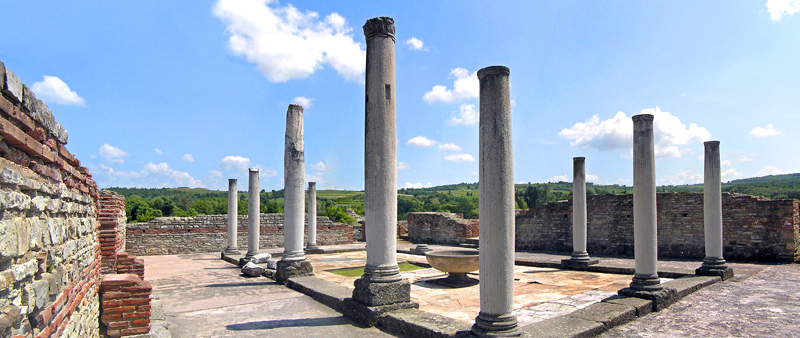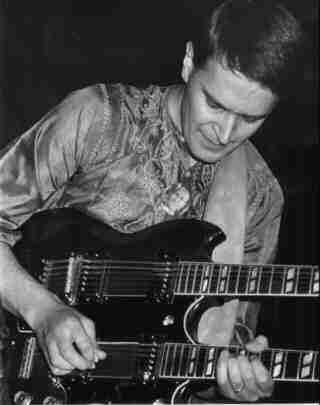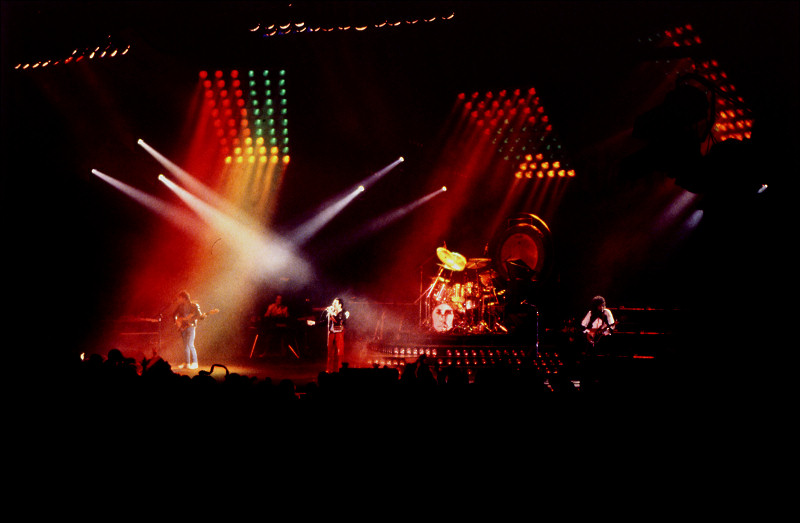|
Kokan Popović
Slobodan "Kokan" Popović is a Serbian drummer notable for playing in bands Idoli and Propaganda. Biography Getting interested in music, first bands Popović was born in Belgrade and lived at Alekse Nenadovica street connecting "Slavija" and "Metropol" hotel, inhabited by people from highest social positions, such as lawyers, politicians, musicians, sportsman, etc., to the lowest, such as prostitutes, drug dealers, thieves, etc. In his early youth he brought some LP compilations of Opatija festivals and played them while using a wooden cigarette box as a drum and after hearing The Who's album A Quick One, he decided to become a drummer. His real drum practices started after moving to Bombay with his father (then being in Yugoslavian Foreign Services), Dejan and mother Božica (sister Dubravka - stood in Belgrade) where he, for the first time, had the chance to practice on a real drum set. His first live appearance was at a Bombay college anniversary. On return to Belgrade P ... [...More Info...] [...Related Items...] OR: [Wikipedia] [Google] [Baidu] |
Drum Kit
A drum kit (also called a drum set, trap set, or simply drums) is a collection of drums, cymbals, and other auxiliary percussion instruments set up to be played by one person. The player ( drummer) typically holds a pair of matching drumsticks, one in each hand, and uses their feet to operate a foot-controlled hi-hat and bass drum pedal. A standard kit may contain: * A snare drum, mounted on a stand * A bass drum, played with a beater moved by a foot-operated pedal * One or more tom-toms, including rack toms and/or floor toms * One or more cymbals, including a ride cymbal and crash cymbal * Hi-hat cymbals, a pair of cymbals that can be manipulated by a foot-operated pedal The drum kit is a part of the standard rhythm section and is used in many types of popular and traditional music styles, ranging from rock and pop to blues and jazz. __TOC__ History Early development Before the development of the drum set, drums and cymbals used in military and orchestral m ... [...More Info...] [...Related Items...] OR: [Wikipedia] [Google] [Baidu] |
Vlada Divljan
Vladimir "Vlada" Divljan ( sr-Cyrl, Владимир "Влада" Дивљан; 10 May 1958 – 4 March 2015), was a Serbian singer and songwriter. He was known as the frontman of the Serbian and Yugoslav rock band Idoli, one of the bands which initiated the Yugoslav new wave on the music and cultural scene of Yugoslavia in the 1980s, as well as for his solo works. Early career Early activity Divljan got interested in music in 1968, after a Drago Diklić concert in Tučepi, a seaside resort where he went on a holiday with his family. After coming back to Belgrade he asked Zdenko Kolar and Boža Jovanović, two of his friends and neighbors, to form a band. The first instrument Divljan played was a small mandolin because he was a fan of Dubrovački trubaduri. Later he got a guitar, Kolar bought a bass and Boža Jovanović used a tin barrel as a drum with metal sticks made by Kolar's father. The band was called Faraoni (Pharaohs) since Divljan had a necklace from Egypt, given by ... [...More Info...] [...Related Items...] OR: [Wikipedia] [Google] [Baidu] |
Borislav Pekić
Borislav Pekić ( sr-cyr, Борислав Пекић, ; 4 February 1930 – 2 July 1992) was a Serbian and Yugoslav writer and political activist. He was born in 1930, to a prominent family in Montenegro, at that time part of the Kingdom of Yugoslavia. From 1945 until his emigration to London in 1971, he lived in Belgrade. He was also one of the founding members of the Democratic Party in Serbia. He is considered one of the most important Serbian literary figures of the 20th century. Life and works Early life and novels Borislav Pekić spent his childhood in different cities of Serbia, Montenegro and Croatia. He graduated from high school in 1945 in Belgrade and shortly afterward was arrested with the accusation of belonging to the secret association "Yugoslav Democratic Youth" and sentenced to fifteen years of prison. During the time in prison, he conceived many of the ideas later developed in his major novels. He was released after five years and in 1953 began studying expe ... [...More Info...] [...Related Items...] OR: [Wikipedia] [Google] [Baidu] |
Odbrana I Poslednji Dani
''Odbrana i poslednji dani'' ( sr-Cyrl, Одбрана и последњи дани; trans. ''The Defense and the Last Days'') is the first studio album by Yugoslav new wave band Idoli released in 1982. ''Džuboks'' magazine critics voted the album the greatest Yugoslav rock album of the 20th century in 1985. The album was polled in 1998 as Yugoslav greatest popular music album in the book '' YU 100: najbolji albumi jugoslovenske rok i pop muzike'' (''YU 100: The Best albums of Yugoslav pop and rock music''). In 2015, ''Odbrana i poslednji dani'' was polled the greatest Yugoslav rock album in the special edition of Croatian ''Rolling Stone''. Overview The band started recording their first long play album during autumn 1981. The record was originally supposed to be produced by the band members themselves with the assistance of Dušan "Spira" Mihajlović, however, Mihajlović soon left the recording sessions, so the album recordings were produced only with help from Mile "Pil ... [...More Info...] [...Related Items...] OR: [Wikipedia] [Google] [Baidu] |
Boža Jovanović
Boža Jovanović was the first drummer of the Serbian rock band Idoli. He was the band member until 1982 and released two singles and one EP with the band. Biography Jovanović has lived in Belgrade in the same apartment building where Vlada Divljan and Zdenko Kolar lived. The three made a deal to start playing. Divljan got a guitar, Kolar bought a bass and Boža Jovanović used a tin barrel as a drum with metal sticks made by Kolar's father. The band was called Faraoni (Pharaohs) since Divljan had a necklace from Egypt, given by his grandmother, with a Tutankhamun medallion. Since there was a popular band from Kopar named Faraoni, the band was renamed to Holipe. The band lasted for a short time. When Dečaci decided to start playing Divljan called Kolar and Jovanović to join the band. At the time the band was working with Dragan Papić, photographer and journalist, who became the band's creative mediator and who published Dečaci photos in a well known youth magazine "Vidi ... [...More Info...] [...Related Items...] OR: [Wikipedia] [Google] [Baidu] |
Pop Rock
Pop rock (also typeset as pop/rock) is a fusion genre with an emphasis on professional songwriting and recording craft, and less emphasis on attitude than rock music. Originating in the late 1950s as an alternative to normal rock and roll, early pop rock was influenced by the beat, arrangements, and original style of rock and roll (and sometimes doo-wop). It may be viewed as a distinct genre field rather than music that overlaps with pop and rock. The detractors of pop rock often deride it as a slick, commercial product and less authentic than rock music. Characteristics and etymology Much pop and rock music has been very similar in sound, instrumentation and even lyrical content. The terms "pop rock" and "power pop" have been used to describe more commercially successful music that uses elements from, or the form of, rock music. Writer Johan Fornas views pop/rock as "one single, continuous genre field", rather than distinct categories. To the authors Larry Starr and Chri ... [...More Info...] [...Related Items...] OR: [Wikipedia] [Google] [Baidu] |
Branko Isaković
Branko Isaković (born June 24, 1958) is a Serbian bass player, producer and composer of Balkan ambient beat. After a long career in pop, rock, and ethno bands he launched his ''Divine Sound'' project with healing music. Biography Isaković was born in Valjevo in 1958 and moved to Belgrade in 1961. His first interest in music came about 1970 when his school friend, today well known guitar player and producer Dušan "Duda" Bezuha needed a rhythm guitarist for his rhythm and blues band. Having finished high school Isaković joined the acoustic rock band Suncokret as a replacement for Bata Sokić who went to serve the army. Isaković left the band in 1978. With former Tilt members Dejan Cukić (vocals) and Predrag Jakovljević (guitar), guitarist Nenad Stamatović and composer and keyboard player Dragan Mitrić, Isaković formed Bulevar. After Bulevar disbanded Isaković went to Idoli, as a replacement for Zdenko Kolar who went to serve the Yugoslav People's Army, the band was ... [...More Info...] [...Related Items...] OR: [Wikipedia] [Google] [Baidu] |
Yugoslav People's Army
The Yugoslav People's Army (abbreviated as JNA/; Macedonian and sr-Cyrl-Latn, Југословенска народна армија, Jugoslovenska narodna armija; Croatian and bs, Jugoslavenska narodna armija; sl, Jugoslovanska ljudska armada, JLA), also called the Yugoslav National Army, was the military of the Socialist Federal Republic of Yugoslavia and its antecedents from 1945 to 1992. Origins The origins of the JNA started during the Yugoslav Partisans of World War II. As a predecessor of the JNA, the People's Liberation Army of Yugoslavia (NOVJ) was formed as a part of the anti-fascist People's Liberation War of Yugoslavia in the Bosnian town of Rudo on 22 December 1941. After the Yugoslav Partisans liberated the country from the Axis Powers, that date was officially celebrated as the "Day of the Army" in the Socialist Federal Republic of Yugoslavia (SFR Yugoslavia). In March 1945, the NOVJ was renamed the "Yugoslav Army" ("''Jugoslavenska/Jugoslovenska Armija' ... [...More Info...] [...Related Items...] OR: [Wikipedia] [Google] [Baidu] |
Zaječar
Zaječar ( sr-Cyrl, Зајечар, ; ro, Zaicear or ) is a city and the administrative center of the Zaječar District in eastern Serbia. According to the 2011 census, the city administrative area has a population of 59,461 inhabitants. Zaječar is widely known for its rock music festival ''Gitarijada'' and for the festival dedicated to contemporary art '' ZALET''. Name In Serbian, the city is known as ''Zaječar'' (; in Romanian as ''Zaicear'', ''Zăiicer'' (archaic name), ''Zăiceri'', ''Zăicear'' or ''Zăiceari''; in Macedonian as and in Bulgarian as (''Zaychar''). The origin of the name is from the Torlak dialect name for "hare" = ''zajec'' / (in all other Serbian dialects it is ''zec'' / , while in Bulgarian it is / zaek"). It means "the man who breeds and keeps hares". Folk etymology in Romanian, gives "Zăiicer" as meaning "the Gods are asking (for sacrifice)". Early renderings of the city in English used ''Saitchar''. History Ancient Three Roman Emperors wer ... [...More Info...] [...Related Items...] OR: [Wikipedia] [Google] [Baidu] |
Novi Sad
Novi Sad ( sr-Cyrl, Нови Сад, ; hu, Újvidék, ; german: Neusatz; see below for other names) is the second largest city in Serbia and the capital of the autonomous province of Vojvodina. It is located in the southern portion of the Pannonian Plain on the border of the Bačka and Syrmia geographical regions. Lying on the banks of the Danube river, the city faces the northern slopes of Fruška Gora. , Novi Sad proper has a population of 231,798 while its urban area (including the adjacent settlements of Petrovaradin and Sremska Kamenica) comprises 277,522 inhabitants. The population of the administrative area of the city totals 341,625 people. Novi Sad was founded in 1694 when Serb merchants formed a colony across the Danube from the Petrovaradin Fortress, a strategic Habsburg military post. In subsequent centuries, it became an important trading, manufacturing and cultural centre, and has historically been dubbed ''the Serbian Athens''. The city was heavily devastated ... [...More Info...] [...Related Items...] OR: [Wikipedia] [Google] [Baidu] |
Jazz Rock
Jazz fusion (also known as fusion and progressive jazz) is a music genre that developed in the late 1960s when musicians combined jazz harmony and jazz improvisation, improvisation with rock music, funk, and rhythm and blues. Electric guitars, amplifiers, and keyboards that were popular in rock and roll started to be used by jazz musicians, particularly those who had grown up listening to rock and roll. Jazz fusion arrangements vary in complexity. Some employ groove-based vamps fixed to a single key or a single chord with a simple, repeated melody. Others use elaborate chord progressions, unconventional time signatures, or melodies with counter-melodies. These arrangements, whether simple or complex, typically include improvised sections that can vary in length, much like in other forms of jazz. As with jazz, jazz fusion can employ brass and woodwind instruments such as trumpet and saxophone, but other instruments often substitute for these. A jazz fusion band is less likely to ... [...More Info...] [...Related Items...] OR: [Wikipedia] [Google] [Baidu] |
Melodic Rock
Arena rock (also known as AOR, melodic rock, stadium rock, anthem rock, pomp rock, corporate rock and dad rock; ; ) is a style of rock music that originated in the mid-1970s. As hard rock bands and those playing a softer yet strident kind of pop rock became increasingly popular, groups began creating material inherently designed for large audiences, and arena rock developed from their use of more commercially oriented and radio-friendly sounds. The often highly produced music, including both upbeat, dramatic songs and slower power ballads, features strong emphasis on melody and frequently employs anthemic choruses. Other major characteristics include prominent guitar effects and the use of keyboard instruments. Many of the above labels are used pejoratively, and discussions over music criticism often delve into the question of whether musicians' focus on rock spectacle and mass appeal results in compromised artistic merit, particularly in terms of the difference between the int ... [...More Info...] [...Related Items...] OR: [Wikipedia] [Google] [Baidu] |



.jpg)

